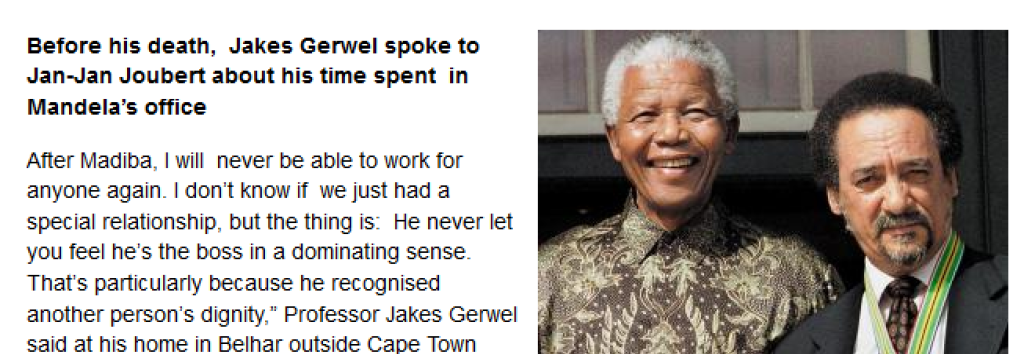In composing the Government of National Unity, Mandela assigned Buthelezi a position that gave him senor status, as minister of home affairs. In addition, among the first things which Mandela had to do on taking office was to make provision for someone to act as president if circumstances required it – in his absence and that of the deputy presidents – he designated Buthelezi who acted as president on several occasions.
Despite some substantial and serious conflicts over the situation in KwaZulu-Natal, between the ANC and IFP, and specifically between Buthelezi and Mandela, the leader of the IFP managed more successfully than De Klerk to combine a public oppositional role with a cooperative stance in Cabinet – Jakes Gerwel recalled that ‘we spoke of the “Wednesday Buthelezi” and the “Saturday Buthelezi”, because he was so mild in Cabinet on Wednesdays and so aggressive at the IFP’s public meetings on Saturdays’.185 The clashes between Mandela played out in Parliament and in the public domain, rather than in Cabinet.
One incident did impact on the Cabinet. Sifiso Zulu, A spokesperson of the Zulu royal house, while being interviewed by the SABC, accused Buthelezi of having appointed himself the Zulu king’s prime minister. Learning of this as the interview was being broadcast, Buthelezi went to the studio and, on air, angrily confronted. Mandela, under pressure to dismiss Buthelezi, but concerned at the impact such action would have on the difficult situation in Kwazulu-Natal, consulted colleagues on what should be done - he was advised that Buthelezi should be asked to apologize to the Cabinet and to the public – which he did.

While the differences between the IFP and the ANC were intense, they were on a relatively narrow front. Buthelezi regarded participation in the Government of National Unity as something that could help achieve the IFP’s constitutional goals. He had not been in favour of participating: ‘As a democrat I do what my people want, even if I don't like it. I did not want to go into this government of national unity in the first place but in the discussion that took many hours the majority said that we should go into that.’186

The relationship between Mandela and Buthelezi had a long and winding history, both personal and political, from the time when both were in the ANC Youth League. It cooled as the IFP shifted away from what Buthelezi described as an ‘ANC front’ and became conflictual and angry after 1994 as the situation in KwaZulu Natal impacted on it (see Chapter on the situation in KwaZulu-Natal). But even during difficult times, they communicated. They corresponded while Mandela was a prisoner, both directly and through Buthelezi’s wife, Irene, on both family and political matters.187

it was a multifaceted relationship
In spite of his differences with the ANC, Buthelezi consistently called for Mandela’s release and refused to negotiate with the government until Mandela and other political prisoners were released. In the period running up to the 1994 elections Mandela frequently spoke with him,188 recognising him as a significant force. By the end, their farewell tributes were, if grudging and ambiguous, nevertheless respectful. Mandela more than once said that he had ‘enormous respect’ for Buthelezi as ‘a formidable survivor’. Buthelezi remained convinced that the difficulties between him and Mandela were a result of the ANC keeping them apart.189

Before the election even, he spoke to Buthelezi
